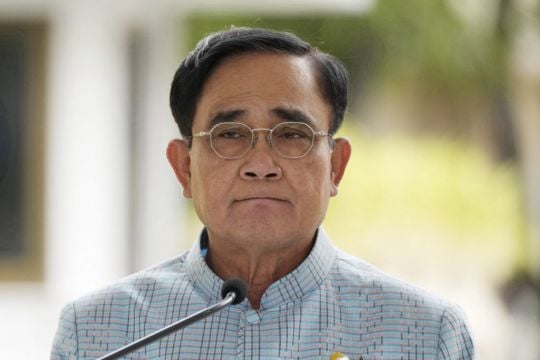Thai Prime Minister Prayuth Chan-ocha, who took power in a 2014 coup, faces the possibility of being ordered by the country’s highest court to step down after exceeding the time he is legally allowed to stay in office.
A ruling in Mr Prayuth’s favour is considered likely but risks invigorating a protest movement long opposed to his government because he came to power undemocratically.
They have called for a demonstration ahead of the court ruling and promised to bring more pressure if he stays.
Last month, the court suspended Mr Prayuth from carrying out the prime minister’s duties pending its ruling.

The senior deputy prime minister in his cabinet, Prawit Wongsuwan, became acting prime minister, while Mr Prayuth retained his concurrent position of defence minister.
The issue before the nine-member court – raised in a petition from opposition legislators – is how to calculate Mr Prayuth’s time in office.
Then an army general, Mr Prayuth led a military coup that ousted an elected government in May 2014, and in August that year, he took the post of prime minister in the military government installed after the coup.
His critics thus contend that the eight-year term limit expired on August 24.
Mr Prayuth’s supporters say the constitution containing the term limit provision came into effect on April 6 2017, and his time in office should be counted from that date.
A more expansive but less likely interpretation favouring his continuing tenure is that the countdown began on June 9 2019, when Mr Prayuth took office following a general election.
If Mr Prayuth stays in power, he still will face a political reckoning early next year when Parliament’s four-year term expires and a new election must be called.
His popularity ratings are low, with critics saying he has mishandled the economy and botched Thailand’s initial response to the Covid-19 pandemic.
In 2020, tens of thousands of people took to the streets to demand that Prayuth and his Cabinet resign, while also calling for the constitution to be amended and the monarchy to be reformed. Several confrontations between the student-driven protest movement and authorities became violent, and there are fears of a recurrence if the court favours Mr Prayuth.
Should the court rule against him, his cabinet would become a caretaker government with limited executive powers. Whether Mr Prayuth himself could be caretaker prime minister is unclear, though the court may decide the matter.







